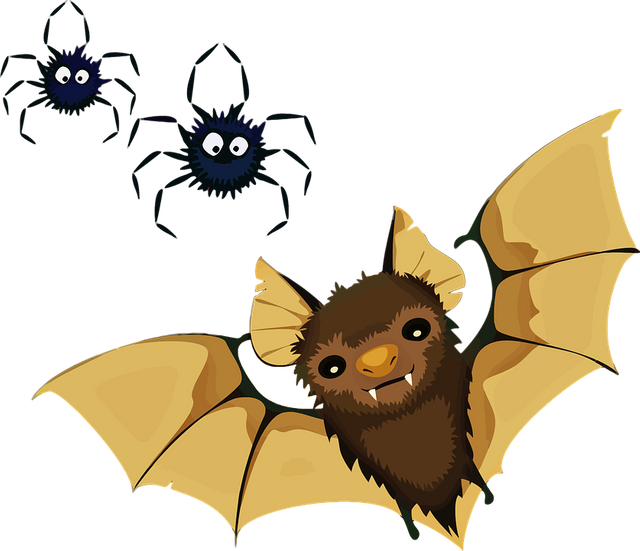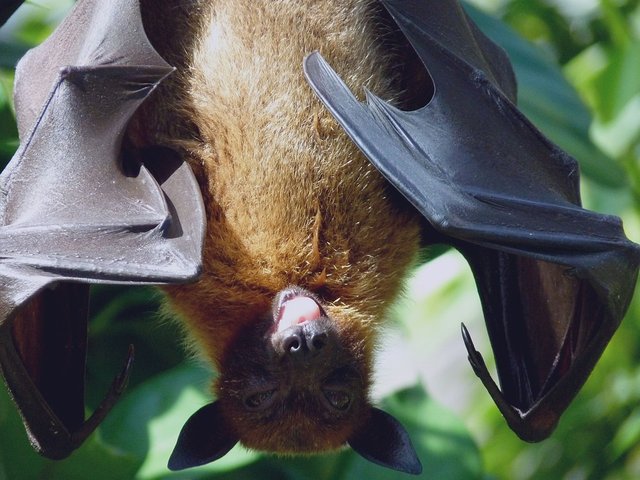Appreciating Bats Part 2: Insect-eating bats save our crops
In my last post on bats, I talked about how these animals are useful pollinators in our agricultural fields as well as in the wild.
In this post, I am going to talk about how insectivorous bats play a vital role in controlling pests by eating them.
When eating a lot is good
Bats eat a lot. A study in 1960 found that insectivorous bats could eat as many as 10 mosquitoes or 14 fruit flies per minute. People have extrapolated that figure to claim that 10,000 mosquitos are eaten by one bat in one night, and while bats may not eat so rapidly all night, they do eat quite a lot of insects. Many species appear to eat almost half of their body weight each night.

Out to haunt… the insects
Source: pixabay
This is a good thing because they eat insects that we would want to get rid of. Those are disease carrying pests such as mosquitoes or the many insects that damage our crops in the field.
You could say that we have an army of flying creatures that come out every night and fight the good fight for us.
They save money and the environment
Since bats eat those insects in the field, farmers need to use less pesticides. This saves money and also helps in keeping the environment safer and cleaner.
One estimate says that bats save between $3.7 billion and $54 billion a year for farmers in the United States. The actual number is likely to be higher if we look at a study published in 2015 that looked at the role of bats in controlling an insect called corn earworm which damages corn kernels.
The researchers in this study selected six plots in a corn field and covered them with nets so that bats could not enter these experimental areas. They also separated an equal number of plots without any covering, so that they could be used as controls. The corn plants in all the plots were infected with corn earworm.
In order to have all other conditions similar, the researchers lowered down the covering nets during daytime so that birds and other insects would not be kept out. At the end of the study, the plots with the enclosing nets were found to have 60% more earworms, and 50% more kernel damage per corn ear. In conclusion, the researchers estimated that bats save up to $1 billion a year in crop damages, taking only corn fields into account.
And they kill mosquitoes too?
Well, yes, but not so much. Mosquitoes are apparently not meaty enough for the bats when other heavier (and more nutritious) insects are available. So we cannot just get some bats and throw away our mosquito repellents yet.
However, bats do eat mosquitoes, and in studies similar to the one I described above, the number of mosquitoes goes down in enclosures where the bats are allowed to forage. This study in the Journal of Medical Entomology is an example.
And meet the company that sells bat houses for “backyard pest control”
The founders of a new company called BatBnB believe that keeping some bats near your home will make your yard free of those annoying and disease-carrying insects. They apparently began researching mosquito control solutions in the wake of the rise of Zika virus and could not find any solution other than more chemicals. And they did not like that. So they came up with the idea of using bats for the purpose.

A house for me?
Source: pixabay
Will these really work? We don’t know yet. We will need to wait until enough people get Bat BnBs and report their experience, or until some researchers use them to conduct a study.
Although we can certainly get a bat house and keep bats near our homes, we need to remember that bats are wild animals and cannot be kept as pets. They can also carry diseases such as rabies and we should get medical attention if we get bitten. In my next post, I will talk about how bats can cause us disease and so as not to scare you, I will also talk about how they are themselves being destroyed by a disease in North America.
Links to references and image sources are provided in the text.
Great post... i think the idea of the BatBnB is a good one. Especially due to the fact that it'll draw attention to bat conservation and appreciation. And also drastically reduce the use of insecticide(if only people know how much that affects the environment). However, at the end of the day, bats are wild animals. I'll be looking forward to your next post to see how well bats and humans can interact with each other. Thanks for sharing @zycr22
Thank you for reading!
Having bats around can have immense positive effects for humans- but it does also pose serious risks for us. Bats are one of the primary reservoirs for zootics, which are diseases that can travel back and forth between humans and animals. Nipah and Hendra viruses both have bats are their reservoirs, as does Marburg. That being said, fruitbats seem to be reservoirs more often than insectivorous bats, which is nice for these purposes. All that said, eliminating bat populations for fear of them spreading disease is also a terrible idea- it's not guaranteed to work, and will likely cause major disruption to local ecosystems.
Edit: Just saw your next post is going to be about bats and disease. Somehow missed that on my first readthrough. Looking forwards to it! You've definitely earned a follow- biology is awesome, but you're tapping into ecology as well, which is one of my favorite topics.
Thanks for reading, and leaving this great comment! And I agree that eliminating bat populations will not work. I suppose the best plan is to try not to encroach upon their natural habitat. After all, they don't attack us unless they are sick or trapped.
Hola. Igualmente, utilizo un traductor por ciertas palabras y un amigo a veces me ayuda a traducir. Genial post. Al leer este tipo de información, recuero el ecosistema en acción. A pesar, de ser una buena idea y ademas natural, en tu próximo post nos contaras sobre ciertas enfermedades que pueden afectar nuestro entorno. Saludos y feliz día. Tienes mi upvote :)
Thanks man! So we are not only talking about the cool animal facts, but also demonstrating the usefulness of Google translate for everyone to see. I did study Spanish for three semesters, but Google certainly knows it better than I do. And yes, ecosystem in action. You have a good day too.
@driva has voted on behalf of @minnowpond.
If you would like to recieve upvotes from minnowponds team on all your posts, simply FOLLOW @minnowpond.
Eating alots hahaha thats good :)
Congratulations @zycr22! You have completed some achievement on Steemit and have been rewarded with new badge(s) :
Click on any badge to view your own Board of Honor on SteemitBoard.
For more information about SteemitBoard, click here
If you no longer want to receive notifications, reply to this comment with the word
STOPCongratulations @zycr22, this post is the forth most rewarded post (based on pending payouts) in the last 12 hours written by a User account holder (accounts that hold between 0.1 and 1.0 Mega Vests). The total number of posts by User account holders during this period was 1481 and the total pending payments to posts in this category was $1821.82. To see the full list of highest paid posts across all accounts categories, click here.
If you do not wish to receive these messages in future, please reply stop to this comment.